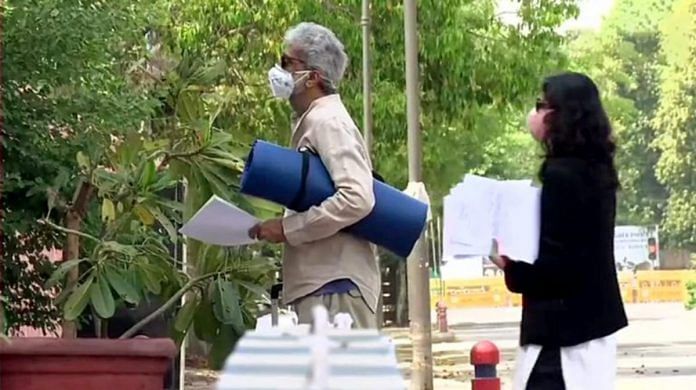Mumbai: The Bombay High Court on Monday dismissed activist Gautam Navlakha’s appeal seeking bail in the Elgar Parishad-Maoist links case, saying it sees no reason to interfere with a special court’s order which earlier rejected his bail plea.
According to police, some activists allegedly made inflammatory speeches and provocative statements at the Elgar Parishad meet in Pune on December 31, 2017, which triggered violence at Koregaon Bhima in the district the next day.
The police have also alleged that the event was backed by some Maoist groups.
The National Investigation Agency (NIA) is conducting a probe into the case.
A bench of Justices S S Shinde and M S Karnik on Monday said it had gone through a special NIA court’s order of last year rejecting Navlakha’s bail plea, and that it saw “no reason to interfere” with the order.
Navlakha approached the HC last year, challenging the special NIA court’s order of July 12, 2020 that rejected his plea for statutory bail.
On December 16 last year, the HC bench reserved its verdict on the plea filed by Navlakha, seeking statutory or default bail on the ground that he had been in custody for over 90 days, but the prosecution failed to file a charge sheet in the case within this period.
The NIA had argued that his plea was not maintainable, and sought an extension to file the charge sheet.
The special court had then accepted NIA’s plea seeking extension of 90 to 180 days to file the charge sheet against Navlakha and his co-accused, activist Dr Anand Teltumbde.
Navlakha’s counsel, senior advocate Kapil Sibal, had told the HC that the NIA was granted the extension to file its charge sheet.
Sibal said Navlakha had already spent 93 days in custody, including 34 days of house arrest, and that the HC must count house arrest as a period of custody.
While he was under house arrest, Navlakha’s personal liberties remained curtailed, Sibal had said.
However, Additional Solicitor General S V Raju, who appeared for the NIA, had argued that Navlakha’s house arrest could not be included in the time spent in the custody of police or NIA, or under judicial custody.
Raju argued that the Pune police arrested Navlakha in August 2018, but had not taken him into custody.
He said the accused remained under house arrest, and the Delhi High Court quashed his arrest and remand order in October 2018.
The FIR against him was re-registered in January 2020, and Navlakha surrendered before the NIA on April 14.
He spent 11 days in the NIA’s custody till April 25, and since then he in judicial custody in the Taloja jail in neighbouring Navi Mumbai.
Raju had argued that if the court “looked from the other angle, it would see that if he (Navlakha) was arrested on August 28, 2018, he should have been enlarged on bail.”
“He was a free man till April 2020. He was neither on bail nor in custody. There cannot be a gap in the custody and detention period,” Raju said.
Also read: Sharjeel Usmani will be arrested wherever he is for speech at Elgar event — Maharashtra govt



